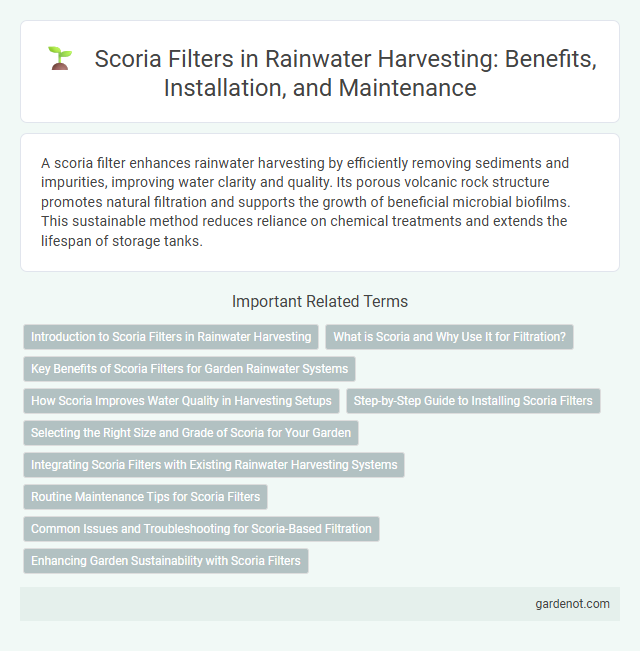A scoria filter enhances rainwater harvesting by efficiently removing sediments and impurities, improving water clarity and quality. Its porous volcanic rock structure promotes natural filtration and supports the growth of beneficial microbial biofilms. This sustainable method reduces reliance on chemical treatments and extends the lifespan of storage tanks.
Introduction to Scoria Filters in Rainwater Harvesting
Scoria filters play a crucial role in rainwater harvesting systems by providing effective filtration through volcanic rock layers. These filters leverage the porous structure of scoria to trap sediments and impurities, improving water quality before storage or use. Their natural, durable composition makes scoria filters a sustainable and low-maintenance option for enhancing rainwater capture and purification.
What is Scoria and Why Use It for Filtration?
Scoria is a porous volcanic rock characterized by its lightweight structure and high surface area, making it an effective natural filtration medium in rainwater harvesting systems. Its abundant micro-pores trap sediments, organic matter, and contaminants, enhancing water quality by reducing turbidity and microbial load. Using scoria for filtration leverages its chemical stability and longevity, providing an eco-friendly and cost-effective method for maintaining clean, potable rainwater.
Key Benefits of Scoria Filters for Garden Rainwater Systems
Scoria filters enhance garden rainwater harvesting by effectively removing debris and impurities, ensuring cleaner water for irrigation. Their porous structure promotes natural filtration and aeration, reducing clogging and maintenance requirements. Using scoria filters in rainwater systems improves water quality, conserves water usage, and supports sustainable gardening practices.
How Scoria Improves Water Quality in Harvesting Setups
Scoria enhances water quality in rainwater harvesting systems by acting as a natural filtration medium that removes sediments, organic matter, and harmful pathogens. Its porous structure increases microbial activity, which aids in breaking down pollutants and reducing contaminants. The mineral composition of scoria also helps in adsorbing heavy metals and balancing pH levels, resulting in cleaner, safer harvested water.
Step-by-Step Guide to Installing Scoria Filters
Begin by selecting a suitable container, such as a large barrel or tank, ensuring it is clean and free from debris. Layer the container with coarse gravel at the bottom, followed by a thick layer of scoria stones, and then a fine sand layer on top to maximize filtration efficiency. Secure the filter with a mesh or cloth cover to prevent contamination, position the system to collect rainwater runoff, and perform regular maintenance by cleaning the layers and replacing scoria as needed.
Selecting the Right Size and Grade of Scoria for Your Garden
Selecting the appropriate size and grade of scoria is crucial for an efficient rainwater harvesting system in your garden, as coarse scoria enhances water filtration and retention while preventing clogging. Opt for a medium to coarse grade, typically between 10 to 20 mm, to balance permeability and sediment capture, ensuring optimal absorption and reducing runoff. Properly graded scoria improves soil aeration and supports plant roots, maximizing the benefits of harvested rainwater for sustainable garden irrigation.
Integrating Scoria Filters with Existing Rainwater Harvesting Systems
Integrating scoria filters with existing rainwater harvesting systems enhances water purification by utilizing the volcanic rock's porous structure to effectively remove sediments and impurities. The lightweight, durable scoria media can be easily retrofitted into filtration chambers or catchment basins, improving water clarity and reducing maintenance frequency. Optimal design considerations include appropriate filter bed depth and flow rate regulation to maximize contaminant removal while preserving system efficiency.
Routine Maintenance Tips for Scoria Filters
Routine maintenance of scoria filters in rainwater harvesting systems includes regular inspection and removal of accumulated debris and sediments to prevent clogging and ensure efficient filtration. Periodic washing or replacement of the scoria media maintains optimal porosity and water flow rates, extending filter lifespan. Monitoring for biofilm buildup and timely cleaning with mild, non-chemical methods preserves microbial balance essential for natural purification.
Common Issues and Troubleshooting for Scoria-Based Filtration
Scoria filters in rainwater harvesting systems often face clogging due to sediment build-up and biofilm formation, reducing filtration efficiency. Regular backwashing and periodic replacement of scoria layers can prevent blockages and maintain flow rates. Monitoring pH levels and preventing organic matter accumulation are essential to avoid microbial growth and ensure long-term filter performance.
Enhancing Garden Sustainability with Scoria Filters
Scoria filters improve rainwater harvesting by effectively removing debris and contaminants, ensuring clean water for garden irrigation. Their porous structure promotes excellent filtration while maintaining soil aeration and moisture retention, enhancing plant health. Integrating scoria filters into rainwater systems boosts garden sustainability by reducing dependence on municipal water and supporting eco-friendly water cycles.
Scoria filter Infographic

 gardenot.com
gardenot.com